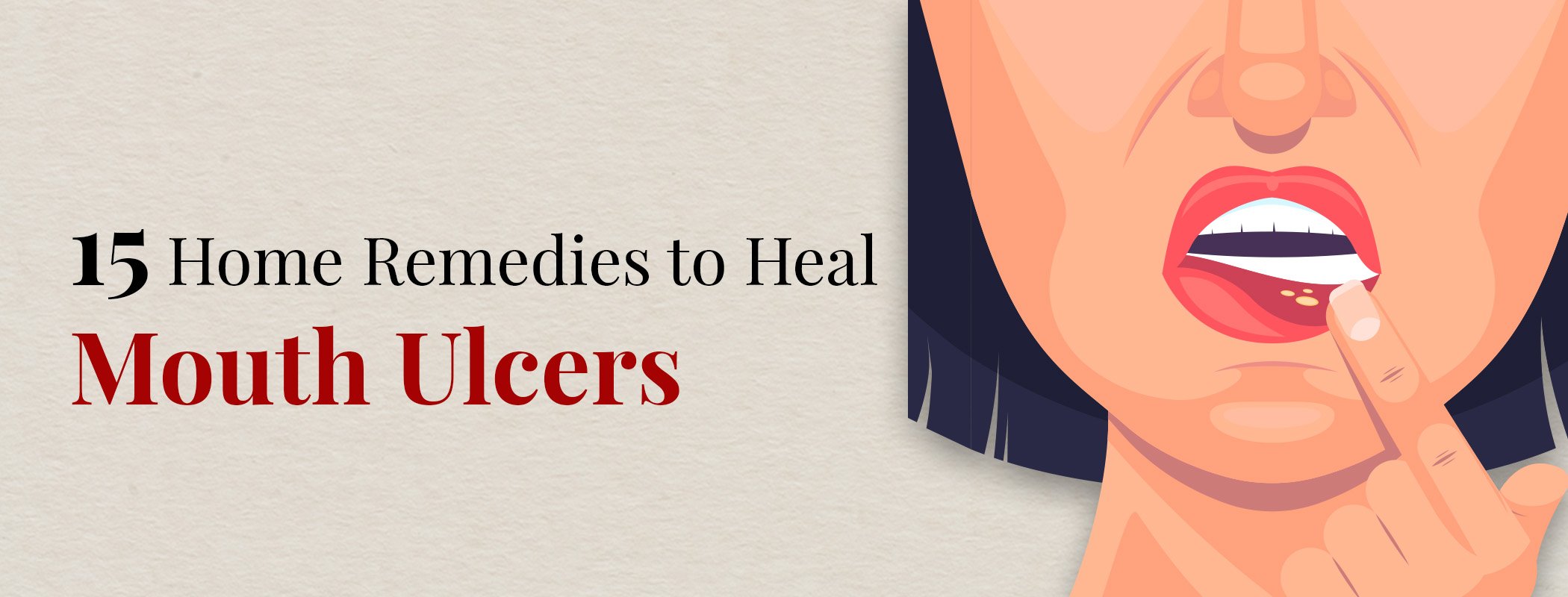Mouth Ulcers
May 16, 2023

Introduction
Mouth ulcers, also known as canker sores, are small, painful sores that develop inside the mouth. While they are usually harmless, they can cause discomfort and make it difficult to eat or speak. Fortunately, several natural remedies can help alleviate pain and speed up healing. In this blog post, we will explore what mouth ulcers are, their causes, and their symptoms and provide you with 15 effective home remedies to cure mouth ulcers fast.
What is a Mouth Ulcer?
A mouth ulcer is a shallow sore or lesion that forms inside the mouth, including the tongue, gums, inner cheeks, or lips. They are usually round or oval-shaped, with a white or yellowish centre and a red border. These painful sores can vary in size, making eating, drinking, or brushing your teeth uncomfortable.
Types of Mouth Ulcer
1. Minor Aphthous Ulcers
Such mouth ulcers are the most common, with 80% of cases due to this type. Small, round or oval aphthous ulcers have a white or yellow center surrounded by the red border. They usually are found on the inner part of the lips, cheeks, or under the tongue. These ulcers, though may be painful, generally heal spontaneously within one to two weeks without scarring.
2. Major Aphthous Ulcers
Although less prevalent, major aphthous ulcers are bigger and deeper than minor aphthous ulcers. They may be more painful and may take several weeks to heal. The major ones lead to scarring and are prone to recurrence. They typically involve the soft palate, the back of the throat, or the bottom of the gums.
3. Herpetiform Ulcers
Herpetiform ulcers, contrary to their name, have nothing to do with the herpes virus. They are defined by aggregates of a number of pinhead-sized erosions that fuse to create large, irregular-looking lesions. Though in themselves they are small each, the number of them in a group makes a considerable and painful ulcer. However, herpetiform ulcers occur less often but are more persistent than minor aphthous ulcers.
Causes of Mouth Ulcers:
The exact cause of mouth ulcers is often unknown, but several factors can contribute to their development. These include:
- Injury or trauma to the mouth, such as accidental biting or brushing too aggressively.
- Certain foods or substances, including acidic or spicy foods, citrus fruits, and tobacco.
- Nutritional deficiencies, particularly in vitamin B12, iron, or folate.
- Hormonal changes, such as those occurring during menstruation.
- Stress or emotional factors.
- Certain medical conditions, such as celiac disease or inflammatory bowel disease.
Symptoms of Mouth Ulcers:
Mouth ulcers typically present the following symptoms:
- Pain or discomfort in the affected area.
- Sensitivity to hot, spicy, or acidic foods.
- Swelling or inflammation.
- White or yellowish centre with a red border.
- Difficulty in talking, eating, or drinking.
- Tingling or burning sensation before the sore appears.
Treatment and Prevention:
1. Over-the-Counter (OTC) Topical Treatments:
Using topical gels or ointments that have compounds like benzocaine or corticosteroids helps to reduce pain and can encourage healing.
2. Avoiding Trigger Foods:
Recurrence of mouth ulcers can be prevented by identifying and avoiding food items that precipitate mouth ulcers such as acidic and spicy foods.
3. Maintaining Oral Hygiene:
Mouth ulcers can be prevented by practicing good oral health measures such as flossing and brushing, which helps reduce the occurrence of bacterial infections.
4. Stress Management:
Stress-reduction methods, including meditation, or yoga, play a positive impact on overall health and prevent stress-related mouth ulcers.
15 Home Remedies to Cure Mouth Ulcers:
- Saltwater rinse: Dissolve one teaspoon of salt in a glass of warm water. Gently swish the saltwater mixture in your mouth for about 30 seconds, then spit it out. Repeat this rinse several times a day. Saltwater helps reduce inflammation, cleanses the ulcer, and promotes healing.
- Honey: Apply a small amount of raw honey directly onto the ulcer using a cotton swab or clean finger. Honey has antimicrobial properties that can help prevent infection and soothe the sore.
- Coconut oil: Take a tablespoon of coconut oil and swish it around in your mouth for a few minutes, making sure to pass it over the ulcer. Spit out the oil afterwards. Coconut oil contains anti-inflammatory and antimicrobial properties that can aid in healing.
- Aloe vera gel: Extract fresh aloe vera gel from an aloe leaf and apply it directly onto the ulcer. Aloe vera has healing properties, including anti-inflammatory and antimicrobial effects, which can accelerate recovery.
- Chamomile tea: Brew a chamomile tea bag in hot water and let it cool down. Use the cooled tea as a mouth rinse, swishing it around your mouth for about 30 seconds. Alternatively, you can apply a soaked chamomile tea bag directly onto the ulcer. Chamomile has soothing properties and can help reduce inflammation and discomfort.
- Baking soda: Mix one teaspoon of baking soda with a small amount of water to form a paste. Apply the paste to the ulcer and leave it on for a few minutes before rinsing your mouth with water. Baking soda can help neutralise acids in the mouth, reduce inflammation, and promote healing.
- Sage mouthwash: Boil fresh sage leaves in water, strain the liquid, and let it cool. Use the sage-infused water as a mouthwash, swishing it around your mouth for about 30 seconds before spitting it out. Sage has antimicrobial properties that can aid in healing mouth ulcers.
- Tea tree oil: Dilute tea tree oil with carrier oil, such as coconut oil, and apply a small amount to the ulcer using a cotton swab. Tea tree oil possesses antimicrobial properties that can help prevent infection and aid healing.
- Vitamin E oil: Break open a vitamin E capsule and apply the oil directly onto the ulcer. Vitamin E has antioxidant and anti-inflammatory properties that can reduce pain and support healing.
- Ice therapy: Suck on ice chips or apply an ice pack wrapped in a cloth to the affected area. The cold temperature helps numb the pain, reduce inflammation, and temporarily relieve discomfort.
- Papaya: Cut a fresh slice of papaya and place it on the ulcer for a few minutes. Papaya contains enzymes, such as papain, which can aid healing and reduce inflammation.
- Clove oil: Apply a small amount of clove oil to the ulcer using a cotton swab. Clove oil has natural analgesic and antiseptic properties that can help relieve pain and fight bacteria.
- Aloe vera gel: Apply fresh aloe vera gel directly onto the ulcer. Aloe vera has soothing and healing properties that can help reduce pain and inflammation and promote healing.
- Vitamin B12: Take a vitamin B12 supplement or consume foods rich in vitamin B12. Vitamin B12 plays a crucial role in oral health and can aid in the healing of mouth ulcers. Foods rich in vitamin B12 include fish, meat, eggs, and dairy products.
- Maintain good oral hygiene: Brush your teeth gently with a soft-bristled toothbrush, carefully avoiding the ulcer. Use toothpaste that does not contain sodium lauryl sulfate, which can irritate ulcers. Good oral hygiene can help prevent further irritation and promote healing.
Who to consult?
For mouth ulcers, consider consulting a dentist or oral medicine specialist. If necessary, your primary care physician can provide guidance and referrals. Dermatologists can be helpful if ulcers are associated with skin conditions.
Conclusion:
Mouth ulcers can be uncomfortable, but with these natural home remedies, you can effectively alleviate the pain and promote faster healing. Remember, if the ulcers persist for more than two weeks, recur frequently, or are accompanied by severe symptoms, it is advisable to consult a healthcare professional. By taking care of your oral hygiene and incorporating these home remedies into your routine, you can find relief from mouth ulcers and get back to enjoying a pain-free mouth.
People also ask
1. What Kills Mouth Ulcers Fast?
There is no definitive cure for mouth ulcers, but certain remedies can help alleviate symptoms and promote faster healing. For example, saltwater rinses, honey, aloe vera gel, and over-the-counter oral gels or ointments containing benzocaine can relieve and speed up healing.
2. What Food Stops Mouth Ulcers?
There is no specific food that can guarantee the prevention of mouth ulcers. However, maintaining a balanced diet rich in vitamins, minerals, and antioxidants can support overall oral health and reduce the likelihood of developing mouth ulcers. In addition, avoiding spicy, acidic, and abrasive foods that irritate the mouth can be beneficial.
3. Which Fruit is Good for Mouth Ulcers?
Certain fruits can be soothing and beneficial for mouth ulcers due to their high vitamin C content and healing properties. Some examples include bananas, papayas, kiwis, and melons. These fruits are soft, non-acidic, and can help provide relief from discomfort.
4. Can We Apply Coconut Oil for Mouth Ulcers?
Yes, applying coconut oil to mouth ulcers can be helpful. Coconut oil has antimicrobial and anti-inflammatory properties that can aid in healing. Rinse your mouth with a tablespoon of coconut oil for a few minutes or apply a small amount directly to the ulcer for relief and potentially faster recovery.








